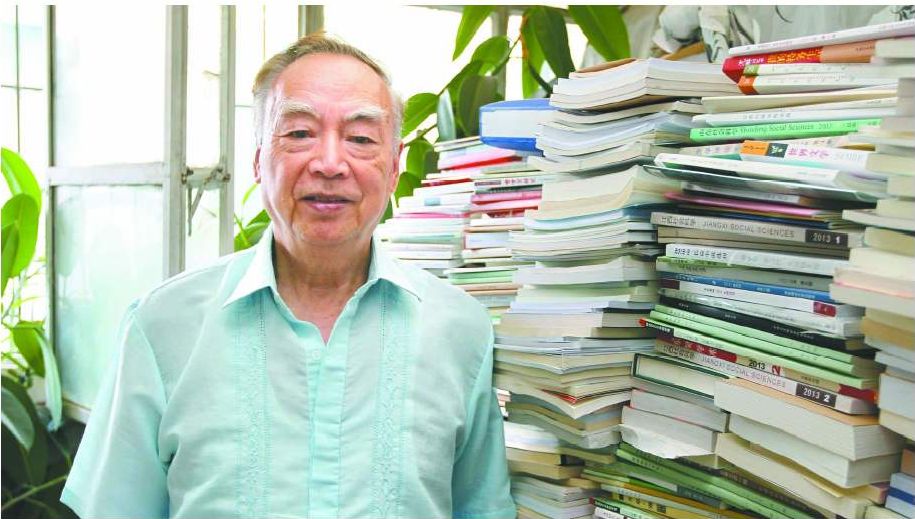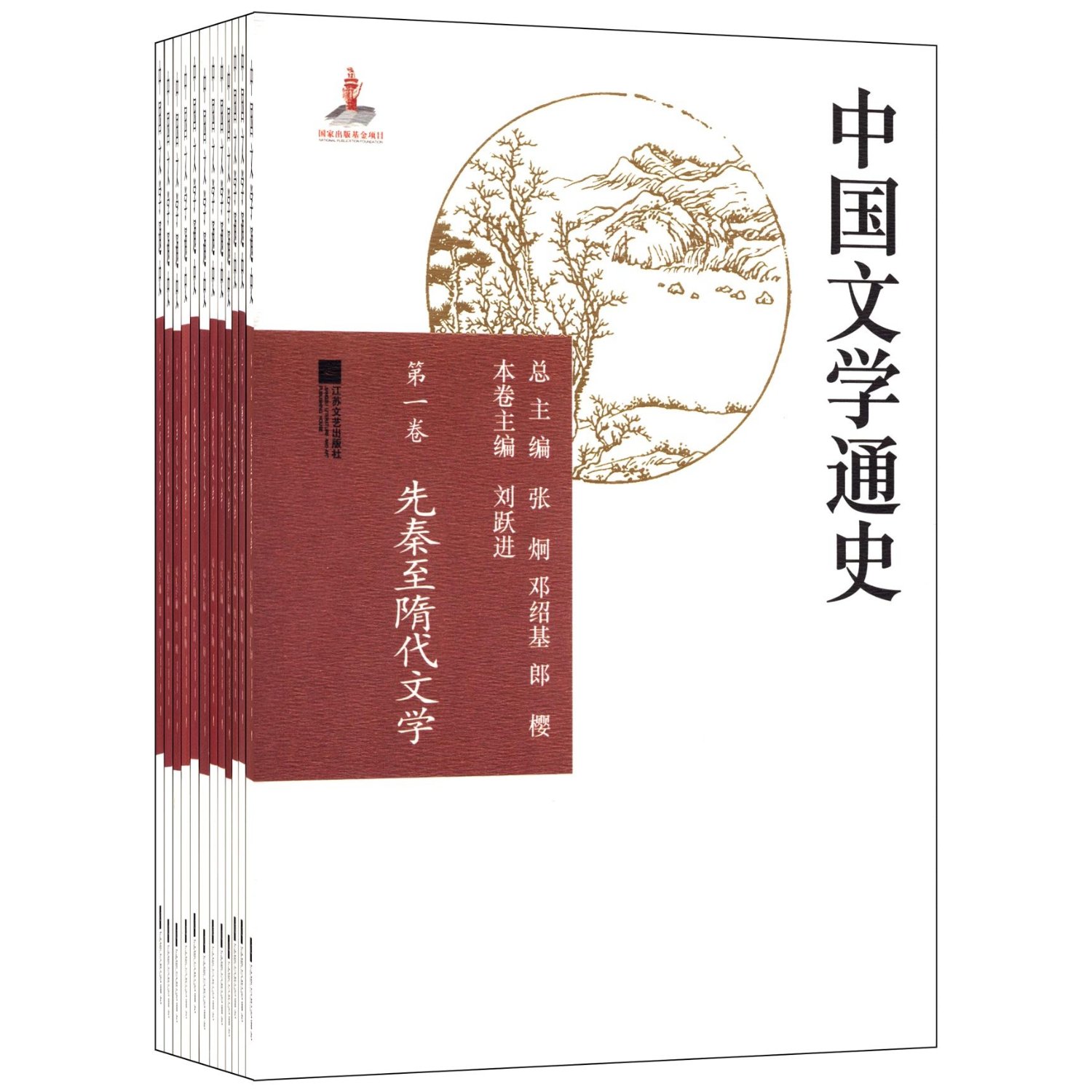Literary, art criticism should be based on serious textual reading, appreciation

Zhang Jiong

Twelve series of A General History of Chinese Literature is mainly complied by Zhang Jiong.
Zhang Jiong (1933- ) is a CASS Member of the Chinese Academy of Social Sciences and honorary vice-president of the Chinese Writers Association. He is a distinguished literary theorist, literary historian and literary critic in China. He has combined Marxist literary and art theory with Chinese literary and art practices and published more than 20 influential works, including A General History of Chinese Literature and Perspectives of Literature.
In modern times, the spread and development of Marxism and its literary and art theory have had a tremendous influence upon new Chinese literature, guiding it into a new age of people’s literature. In order to understand the effect of Marxist literary and art theory on new Chinese literature, a CSST reporter talked with Zhang Jiong.
CSST: What guiding role does Marxist literary and artistic creation theory play in Chinese literary creation?
Zhang: Literary and artistic creation theory involves the source, process and thinking of literature creation, and concerns the relationships among literature, art and reality; sense and reason; subject and object, and artistic methods and worldview. In these respects, Mao Zedong drew upon the theory of reflection of dialectical materialism and indicated that, “Literary works, as a kind of ideology, are a product of certain social activities reflected in the human mind.” Social activities are the “unique source of inexhaustible inspiration for all literature and art.” Mao elaborated that artistic beauty may exceed the beauty of real life. He once affirmed that poetic creation should take advantage of imagery but he also pointed out that a creative subject’s initiative, thoughts, emotions and worldview play a significant role in literary and artistic creation. When Engels talked about Balzac’s creations, Engels not only spoke highly of the authenticity of Balzac’s realism but also criticized his negative influences on creations due to his worldview limitations. It demonstrates that Mao and Engels put an emphasis on both the function objects play in the source of creative writing, and the role a literary and art professionals plays in literary and artistic creation as the subject. Some literary and art theorists argue that the characteristic of literary and art creation is to utilize imagery thinking and shouldn’t involve rational participation. But it is impossible that the creation of a novel, essay, drama, or especially a long literary piece, can work well without reason and worldview. So ideas and discussions of classic writers of Marxism can show us the orientation of literary and art creations.
CSST: As a famous literary critic, what’s your viewpoint about classic writers’ criticism theory and contemporary Chinese literary criticism?
Zhang: Classic Marxist writers all stress literary and art criticism and personally wrote articles on literary and art criticism. They have left their thoughts on approaches, standards and attitudes of literary and art criticism. Literary and art criticism contains appreciation, text explanation, comment and research. Literary and art critics are friends of writers and readers. They not only interpret writers’ works to readers but also provide readers’ feedback to writers, indicating works’ advantages and disadvantages and thus promote literary and artistic creation. For literary and art criticism, the selection of criticism criteria is a key problem. In fact, Engel’s aesthetic and historical criticism criteria and Mao’s political and artistic criteria both include the true, good and beautiful elements. Since the reform and opening up, literary and art criticism has become increasingly diverse, with various perspectives and approaches in China, including Marxist literary and art criticism, Western 20th-century-born formalism, structuralism, deconstruction criticism, and psychoanalytic criticism, existential criticism, semiotic criticism and archetypal criticism. Undoubtedly, all kinds of criticism have their own academic value. In general, they help people to thoroughly understand literature and art in every respect and for writers to strive for creation.
I think, by any means, literary and art criticism should be established on the foundation of serious textual reading and appreciation. It should understand writers and their times, respect the truth, and genuinely tell the good when there is a good thing and vice versa. Marxist classic writers’ critical articles provide a good model for us. In practices of literary and art criticism, every critic actually has their own criticism criteria formed on the basis of worldview, view of life, values, and literary and artistic views. I think that the type of criteria is closely related to the purpose for which critics write. If you want to reveal the essence or social nature of works to readers, then it is much more appropriate to adopt aesthetic and historical criticism criteria or the true, good and beautiful criteria. If you want to make articles play a political function, then sticking to political criteria is the obvious choice. If you want to illuminate works’ ideological significance and artistic value, then ideological and artistic criteria are indispensable. According to theories of formalism, literature focuses on forms, and what literature reflects and expresses are not important. Hence, formalism criticism and its outcomes, such as structuralism criticism and new criticism, take the innovative application of forms, structures and languages as a significant standard. Among all sorts of standards, I think Engels’ aesthetic and historical criticism criteria have the greatest range and are best fit to the substantive characteristics of literature and art. His criteria cover works’ content and form, thought and art, the height of thought and its depth and width reflecting reality, which in fact contains the true, good and beautiful criteria. It means that aesthetic and historical criticism criteria reflects truth in reality, expresses moral goodness and builds the beauty of form. Furthermore, historical criteria not only reflect the truth, depth and width of the history but also contain the politics and morals of history. Therefore, this kind of literary and art criticism may be needed by most of readers and be more helpful for readers to relatively comprehensively understand the value of literary works.
CSST: There is no doubt that the relationships among literature, art and politics has become a significant ecological correlation in the development of literature and art. Different opinions on it have emerged in the Chinese literary world. So what opinions do classical Marxist writers have on the relationships among literature, art and politics?
Zhang: Classic Marxist writers argue that literature and art is the aesthetic ideology of social superstructure ideologies, expounding upon their ideas that literature, art and politics are interrelated and share differences. Classic Marxist writers all expressed that literature and art should serve proletarian politics. Marx and Engels not only affirmed and praised the political tendency that could be seen in many great European writers’ works but also spoke highly of poems created during the British labor movements and those written by German socialist poets. But they never said that all literary and art works must allude to political content or have political tendencies and must serve politics to a certain degree. In 1942, during the War of Resistance against Japan and World Anti-Fascist War, Mao proposed that “in the present world, all culture or literature and art belong to certain classes and political lines,” which was of course rooted in the specific historical background at that time. In fact, literary and art works have various topics and are created at different places and in various times. They come from different writers so it is impossible for all works to have political connotation. For instance, scenic poems, bird-and-flower paintings and absolute music are exceptions. So Deng Xiaoping gave up the proposal of “literature and art must serve politics” and promoted “serving people and socialism” to encourage the diversity of creative topics, themes, forms and styles. At the same time, Deng also stressed that “literature and art cannot break away from politics.” This is because literary and art professionals always have certain political points of view, opinions and emotion and tend to more or less express their ideas in their works. Moreover, when politicians, political parties and all governments enact literary and art policies and decrees, they all take political interests into account. So it is difficult for literature and art to be completely divorced from politics.

 PRINT
PRINT CLOSE
CLOSE